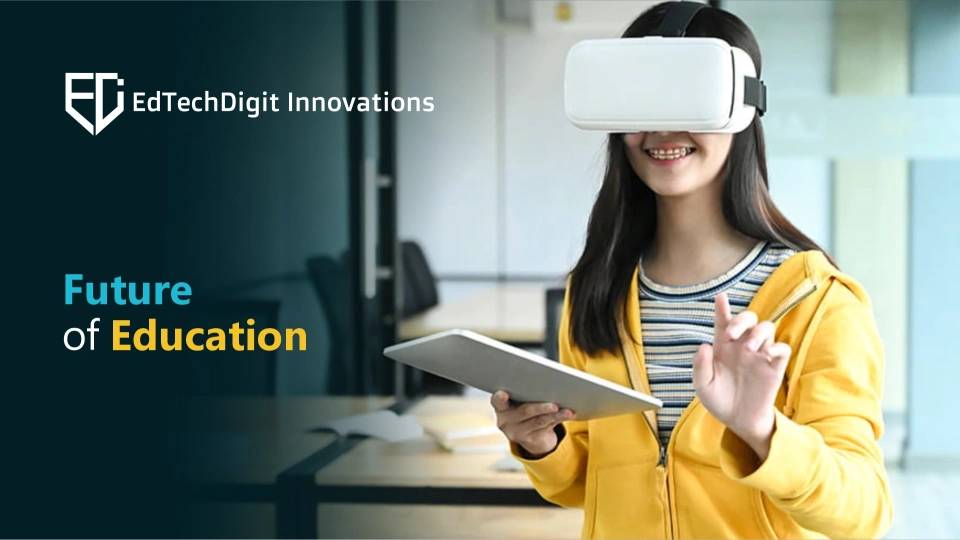Needless to say, the education industry has undergone significant evolution today. It is shifting faster than most curricula. If we look towards the future of education, the classroom of tomorrow will be less of fixed lecture halls and more of a modular and result-oriented learning. The modern education will be about leveraging advanced technologies, industry partnerships, micro-credentials, and lifelong learning, not just stopping at higher education.
In this article, let us explore such top academic trends in education in 2025 that will shape the future of education in the coming years.
Artificial Intelligence as a Classroom Co-worker (not just a tool)
Artificial intelligence is no longer just a buzzword. From AI chatbots that answer homework questions to tools that adapt lessons for each student’s pace, it’s becoming a real partner in the learning process. Teachers are using AI to track progress, spot learning gaps early, and spend more time guiding students instead of grading papers. The use of AI in education is exploding. The global AI in Education market is projected to grow from $5.47 billion in 2024 to approximately $7.57 billion in 2025, reflecting a compound annual growth rate (CAGR) of around 38.4 % (The Business Research Company).
The challenge now is making sure AI is used responsibly, without bias, and in ways that protect student privacy.
The Rise of Short Courses And Microcredentials
Degrees will always hold true value as the most important educational qualification; however, they will not be the only ticket to getting a good job. Employers have started valuing short, skill-based programs, often called micro-credentials or badges, that offer learners a faster way to gain industry-relevant skills and prove their knowledge.
Micro credentials can be completed within a week or a month, as per the program, unlike lengthy higher education courses, and they are linked directly to industrial needs. So, a lot of students and professionals now combine these smaller credentials to build a career path that's flexible, relevant, and latest with job market trends.
Learning Doesn't Stop After Graduation
Often it is considered as higher education degrees are considered the pinnacle of educational qualifications. But now, as the industries are changing rapidly, students and professionals are expected to continuously upgrade as per industry requirements to grow in their careers.
Governments, universities, and employers promote the lifelong learning trend in education in 2025 through part-time courses, online modules, and professional training workshops. This shift means people of all ages are becoming students again, either to switch their careers, move up the ladder, or simply keep up with the latest trends.
Skills Over Seat Time
Now, educational institutions have started moving towards competency-based education that mostly focuses on proving how students can do something rather than just spending a set amount of time in class.
In this educational model, if a student masters a skill quickly, then they can move on without waiting for the semester to end. This type of education system is especially popular in fields like healthcare, IT, and trades where hands-on experience matters more than lecture hours.
Hybrid And Immersive Learning
The pandemic has definitely forced online learning into the spotlight, but now it is here to stay, and of course, in a much better form. Hybrid learning refers to a mix of in-person classroom teaching and online classes offer students more flexibility in learning.
On top of that, new tools like virtual reality (VR) and augmented reality (AR) are helping students practice real-world scenarios, from virtual science labs to field trips, in safe interactive environments without leaving the classroom.
Closing the Disadvantage Gap in Schools
The future of education will greatly focus on ensuring all students get equal opportunities to succeed, irrespective of their backgrounds. So, institutes will have to provide targeted support to disadvantaged students, ensure access to quality teaching, and make resources available to meet individual learning needs.
Institutes can also employ strategies like tutoring, mentoring, and engaging families to build strong home-school connections.
What Does This Mean For Students?
Students today have more choices than ever before. They can choose to learn through traditional degrees, leverage short courses, or enroll in online programs like AI certifications, data science certifications, cybersecurity certifications, or digital marketing certifications, for example. Moreover, digital portfolios are replacing old-style resumes that show employers what exactly a professional can do.
What Does This Mean for Teachers?
Teachers are shifting from being the “sage on the stage” to more of a coach and guide. They’re helping students choose the right learning path, using technology to track progress, and focusing more on problem-solving and creativity.
What Does This Mean for Employers?
Employers are starting to value skills and experience over just formal degrees. They are partnering with schools to customize training programs, actively accepting microcredentials, and even funding employees’ continued education.
Summing up!
The future of education will be flexible, technology-driven, result-oriented, and more focused on real-world skills.
Whether you are a student just starting out in your career journey or a professional looking to grow, or a teacher enhancing your skills, being aware of these trends will surely affect how you learn, work, and teach in the years to come.

